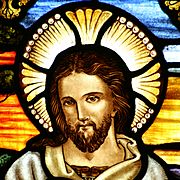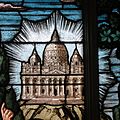Ecclesiology facts for kids
In Christian theology, ecclesiology is the study of doctrine about the Church itself as a community and about the churches own view of its mission and role.
That means that ecclesiology looks at the role of the church in salvation, at its origin, its relationship to the historical Christ, its discipline, its destiny (see Eschatology) and its leadership.
In addition to describing a broad discipline of theology, ecclesiology may be used in the specific sense of a particular church or denomination’s character, self-described or otherwise. This is the sense of the word in such phrases as Roman Catholic ecclesiology, Lutheran ecclesiology, and ecumenical ecclesiology.
Contents
Questions asked by ecclesiology
Ecclesiology asks the questions:
- Who is the Church? Is it a visible or earthly corporation -- a "church" in the sense of a specific denomination or institution, for instance? Or is it the body of all believing Christians regardless of their denominational differences and disunity? What is the relationship between living Christians and departed Christians (the "cloud of witnesses" Epistle to the Hebrews 12:1)-- do they (those on Earth and those in Heaven) constitute together the Church?
- Must one join a church? That is, what is the role of corporate worship in the spiritual lives of believers? Is it in fact necessary? Can salvation be found outside of formal membership in a given faith community, and what constitutes "membership?" (Baptism? Formal acceptance of a creed? Regular participation?)
- What is the authority of the Christian church? Who gets to interpret the doctrines of the Church? Is the organizational structure itself, either in a single corporate body, or generally within the range of formal church structures, an independent vehicle of revelation or of God's grace?
- What does the Church do? What are the sacraments, divine ordinances, and liturgies, in the context of the Church, and are they part of the Church's mission to preach the Gospel?
- How should the Church be governed? What was the mission and authority of the Apostles, and is this handed down through the sacraments today? What are the proper methods of choosing clergy such as bishops and priests, and what is their role within the context of the Church?
- What are the roles of 'spiritual gifts' in the life of the church?
- How does the Church's 'new covenant' relate to the covenants expressed in scripture with God's chosen people, the Jewish people?
- What is the ultimate destiny of the Church in Christian eschatology?
Related pages
Beliefs that define the Church
- Body of Christ
- Biblical canon
- Creed
- Orthodoxy
- Theology -- beliefs about the nature of God. This can include Pneumatology - beliefs about the Holy Spirit, Christology - beliefs about Jesus being the Messiah, and Soteriology -beliefs about how people are saved
Rituals that define the Church
Topics in church government
- Apostolic succession - Catholics, Eastern Orthodox and Anglicanism all claim to have priests ordained by priests going back to the Twelve Apostles.
- Autocephaly
- Canon Law
- One Holy Catholic and Apostolic Church
- Separation of church and state
- Full communion
- Laity
- Ecclesia (sociology of religion)
- Sect
- Cult
- Ecclesiastical polity
- Connectionalism
- Congregational polity
- Episcopal polity
- Presbyterian church governance
- Clergy
- Pope
- Patriarch
- Metropolitan
- Archbishop
- Bishop
- Elder
- Priest
- Deacon
- Pastor
- Priesthood of all believers
Images for kids
-
Stained-glass window in a Catholic church depicting St. Peter's Basilica in Rome sitting "Upon this rock," a reference to Matthew 16:18. Most present-day Catholics interpret Jesus as saying he was building his church on the rock of the Apostle Peter and the line of popes who claim Petrine succession from him.
-
A 17th-century illustration of Article VII: Of the Church from the Augsburg Confession, which states "...one holy Church is to continue forever. The Church is the congregation of saints, in which the Gospel is rightly taught and the Sacraments are rightly administered." Here the rock from Matthew 16:18 refers to the preaching and ministry of Jesus as the Christ, a view discussed at length in the 1537 Treatise.
See also
 In Spanish: Eclesiología para niños
In Spanish: Eclesiología para niños




